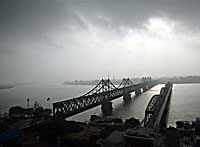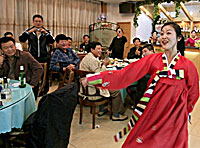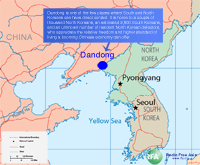




SHENYANG, China—At the Pyongyang Sweet Meat restaurant in northeastern China, a popular North Korean tune plays over the loudspeakers, as diners are shown to packed tables by North Korean waiters ready to explain the intricacies of the restaurant’s speciality: dog.
“Sweet meat” means dog meat in North Korea, and this restaurant in Shenyang is busy feeding a mixed clientele of Chinese and South Korean customers.
Eight staff members ply the tables, explaining the recipes to guests. “The secret of dog meat is how you prepare the soup and also how you eat it,” one waiter says.
“One has to sweat while eating, and that is how all of the germs and toxins are eliminated from the human body. Eating dog soup provides great detoxification,” he adds. At about 8 p.m., two of the waiting staff begin to sing, and the party begins to swing.
Of 10 North Koreans you meet in Dandong, nine will tell you that they are well connected in North Korea, that they know somebody powerful or a person somehow related to Kim Jong-Il.
South Korean businessman Kim Jae Kyu says he is having a great time.
“The waiting staff is well trained, kind, competent, and somehow classy. Everyone enjoys this combination of exquisite food and quality entertainment,” he tells RFA’s Korean service.
Northeast China is increasingly becoming a meeting point for Koreans from both sides of the 38th parallel, who have been divided by the self-imposed isolation of the Stalinist North since 1950.
Three hours’ drive from Shenyang lies Dandong, one of the few gateways into North Korea, connected by road and rail to the city of Shinuiju by the Sino-Korea Friendship Bridge across the Yalu River.
Seventy percent of North Korea’s external trade traffic thunders across this bridge, which is decked with neon lights on the Chinese side, yet dark once the halfway point has been crossed.
Deals are being done in Dandong—which is home to several dog meat restaurants—because the city is one of the few places where South and North Koreans can have direct contact.

Eager to earn hard currency, North Korea has dispatched several thousand workers to Dandong, but they lack the training to engage in business transactions, resulting in discontent and distrust among some of the city’s 2,800 South Korean residents.
One South Korean businessman, surnamed Park, said he has had extensive dealings with North Koreans in Dandong.
“One should never hand over an advance payment to North Koreans,” Park said.
“Based on my experience with North Koreans, there is a 90 percent probability that the job will not get done, if advance payment is made,” he said.
A fellow entrepreneur from the South, surnamed Kim, agreed.
“Of 10 North Koreans you meet in Dandong, nine will tell you that they are well connected in North Korea, that they know somebody powerful or a person somehow related to Kim Jong-Il,” Kim said, adding that these claims were mostly scams.
While no reliable statistics exist about inter-Korean business deals in Dandong, tales of ripoffs abound.
Park Sung Shik, chairman of the Seoul-based Inter-Korean Logistics Forum, said problems of authentication were holding back investors.
“In practical terms, there is no proper verification in place prior to sending these people to Dandong,” Park said.
“They introduce themselves to South Korean businessmen as they please, but we have no available means to check their identity or the credentials they claim.”

Currently, all foreign investment into North Korea must go through the all-powerful National Economic Cooperation Federation (NECF), which manages the disbursement of humanitarian aid to North Korea as well as South Korean investment in the North, and has offices in Dandong and Yanji, China and Vladivostok, Russia.
But Korean American and Chinese investors have complained that the funding is not being properly disbursed, and the NECF is currently being investigated by the North Korean authorities, according to Chinese sources in Dandong.
According to one Chinese Korean travel agency: “Operating in North Korea is risky, as one has to deal with NECF people who don’t really understand how the market economy operates.”
Dandong is also home to a significant number of North Korean defectors, who seem to understand the benefits of a market economy and the relative social freedom of a Chinese city only too well.
“What I realized when I defected from North Korea and settled down in Dandong was that people need the basics of life, such as proper food and clothing, but also freedom, in order to live like human beings,” Dandong-based defector Kim Man Chul said.
Another defector, Ms. Lee, settled in Dandong for the same reason.
“I have more freedom here. I can speak my mind and say whatever I want,” she said.
Original reporting in Korean by S.W.Park and K.C.Lee. Korean service director: Kwang C. Lee. Translation, with additional research, by Grigore Scarlatoiu. Written for the Web in English by Luisetta Mudie. Edited by Sarah Jackson-Han.